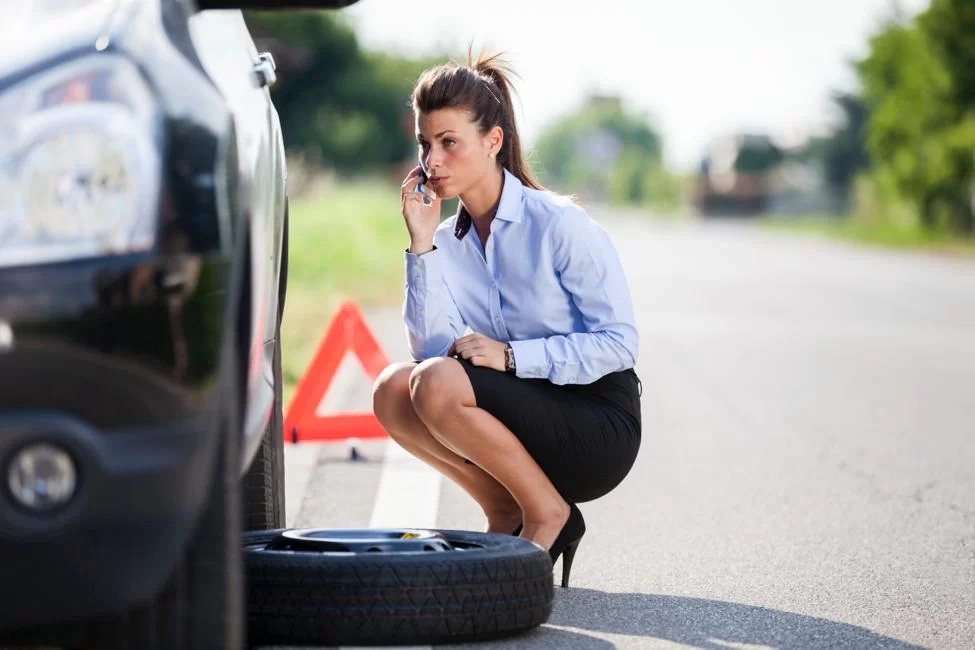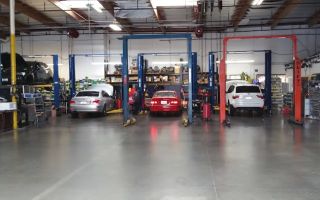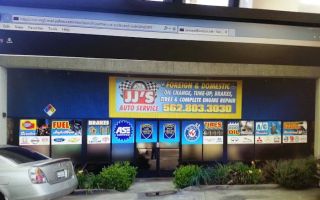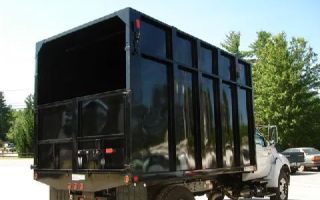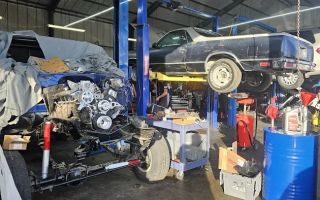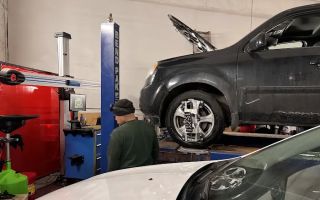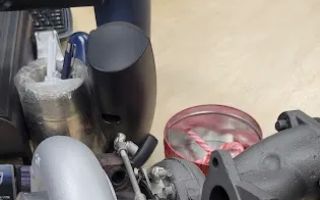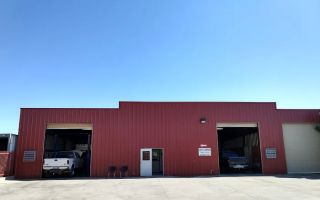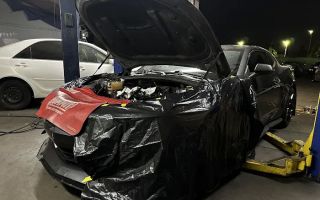How to Safely Handle a Tire Blowout on the Freeway
There’s nothing quite like the heart-stopping moment when you feel a sudden thud, followed by the sharp pull of your car to one side of the freeway. You’ve experienced a tire blowout. I know this feeling all too well—being stranded on a busy freeway with cars zooming past at high speeds can be terrifying. But over the years, I’ve learned exactly what to do to stay calm, stay safe, and get myself back on the road as quickly as possible. If you’ve ever wondered how to handle a tire blowout while driving at high speeds, I’m here to share everything you need to know.

MR. TIRE INC.
2078 New York Ave, Huntington Station, NY 11746, USA
1. Recognizing the Signs of a Blowout
Before I jump into what to do, let me first talk about recognizing the signs of a tire blowout. It’s not always as dramatic as it sounds. Sometimes it can happen so quickly that you may not even realize the cause until it’s too late. It could start with a loud bang or a sudden popping noise. You might also feel the car vibrating or swerving uncontrollably. In some cases, the blowout is accompanied by a drop in tire pressure that you can feel through the steering wheel or hear. Understanding the difference between a flat tire and a blowout is important because the way you handle each situation is completely different.
The key signs that you’re dealing with a blowout are the sudden loss of control of the vehicle, a very loud noise, and the car pulling to one side. When I’ve experienced a blowout, the car pulls strongly to one side, and I can feel the steering wheel fighting me as if it’s trying to turn sharply on its own. That’s the moment I know something is very wrong and it’s time to take action immediately.

MR. TIRE INC.
2078 New York Ave, Huntington Station, NY 11746, USA
2. Stay Calm and Maintain Control
The first thing I remind myself in these situations is to stay calm. A tire blowout can be incredibly alarming, especially when you’re on a busy freeway. But the last thing you want to do is panic. Panicking can make the situation worse and increase the likelihood of an accident. I’ve learned that the key is to maintain control of the vehicle, even as the tire is losing air.
Here’s what I do to stay in control:
2.1 Keep a Firm Grip on the Steering Wheel
It’s crucial to keep a firm grip on the steering wheel. The car will try to pull in the direction of the flat or blown tire, but by holding the wheel firmly, I can maintain some level of control. If the blowout is on the right rear tire, for example, the car will pull to the right. Similarly, if it’s the front tire, the car may jerk to the left or right, depending on which side has blown out. By keeping the steering wheel steady, I can help guide the car safely out of the lane and away from traffic.
2.2 Do Not Slam on the Brakes
One of the biggest mistakes I see drivers make during a blowout is slamming on the brakes. I’ve learned from experience that braking hard can cause the car to spin or skid, especially when the tire is already compromised. Instead, I gently apply the brakes, not too hard but enough to begin slowing down gradually. It’s important to allow the car to slow naturally without adding further stress to the remaining tires.
2.3 Avoid Jerky Movements
I also make sure to avoid jerking the steering wheel. Sudden movements could throw the vehicle into a dangerous situation, especially if the car is already unstable due to the blowout. I try to keep my steering smooth and consistent, making gradual adjustments as needed to safely guide the car off the road.
3. Safely Steer to the Shoulder
After I’ve regained a level of control, the next step is to steer the car toward the shoulder of the freeway. This is critical for safety because staying in the lane or trying to coast too far could put me and other drivers at risk. I’ve learned to signal as early as possible to warn other drivers of my intentions. The sooner I get off the freeway, the safer it will be.
3.1 Signaling and Slowing Down
Before making any move, I always signal my intention to move to the right lane or shoulder. This gives other drivers plenty of warning. I then begin to reduce speed gently by letting off the accelerator and applying just enough brake to slow the vehicle. Gradually pulling over to the shoulder will help prevent any sudden swerves that could cause an accident. Once I’m safely off the freeway, I pull as far to the right as possible, allowing enough space for passing traffic.
3.2 Parking in a Safe Area
When I’m on the shoulder, I make sure my car is parked in a safe spot where I’m visible to other drivers, especially in low-light conditions. If it’s dark, I make sure my hazard lights are on to alert others to my presence. I always try to park my car far enough away from traffic to give myself a buffer zone, and if there’s a barrier or a wide shoulder, I’ll move the car as far as I can to avoid any risk of being rear-ended.
4. What to Do Next: Assessing the Damage
Once the car is safely stopped, I can assess the situation. The first thing I check is which tire has blown out. This is important because it helps me determine whether I can fix it myself or if I need to call for professional help. If I have a spare tire, I usually feel a sense of relief because changing the tire can be done relatively quickly. However, if I don’t have the right tools or the blowout is too severe to repair on the spot, it’s time to call for professional assistance.
4.1 Change the Tire (If Possible)
If I’m equipped with a spare tire, jack, and wrench, I begin the process of changing the flat. I’ve changed a tire on the side of the freeway a few times, and it’s always a bit nerve-wracking with traffic rushing by. But if you have the tools and know-how, changing a tire is a manageable job. I make sure to follow all the proper steps for lifting the car, removing the lug nuts, and replacing the blown tire with the spare.
4.2 Calling for Roadside Assistance
If I’m not in a position to change the tire myself, I don’t hesitate to call for roadside assistance. Many auto insurance policies provide roadside assistance coverage, and even if you don’t have a spare tire, they can come to your location, fix the issue, or tow your car to the nearest repair shop. I’ve had roadside assistance come to my aid in a matter of 30 minutes in some cases, so it’s always reassuring to have that option in place.
5. When to Call for a Tow
There are times when a tire blowout may leave me with more damage than I can handle. If I’ve hit a curb, for example, or if there’s significant damage to the rim or axle, it might be unsafe to replace the tire myself. In these situations, I always opt for a tow. I call a towing service to take my vehicle to a mechanic for a more thorough inspection and repair. If you're not sure whether you can drive the car, it's always safer to call for a tow truck.
6. Preventing Future Blowouts
After experiencing a blowout, I’m much more aware of the importance of tire maintenance. Keeping tires properly inflated, checking for damage regularly, and replacing tires before they become worn out can all help prevent blowouts. I also make sure to have a well-maintained spare tire and a functioning jack in my car at all times, so I’m prepared for emergencies. These simple precautions can go a long way in ensuring I’m not caught off guard in the future.
Handling a tire blowout on the freeway can be one of the most stressful driving experiences, but knowing what to do can make all the difference. Stay calm, stay in control, and always prioritize safety for both you and other drivers on the road. If you’re ever in doubt, don’t hesitate to call for help. Roadside assistance or towing services are just a call away to ensure you get the help you need to get back on the road safely.

